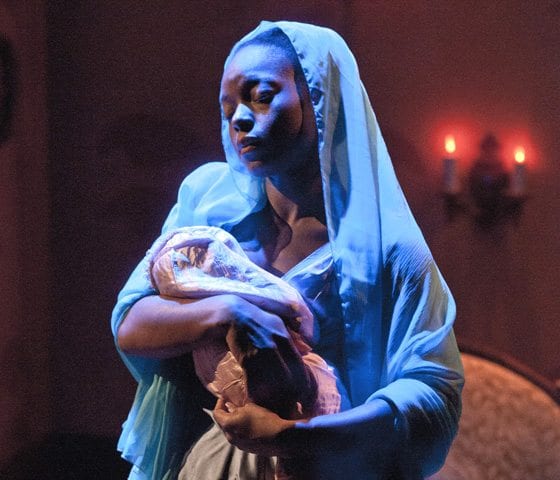

Lindsay McWhorter loves performing in Boston. The 26-year-old Atlanta-born and Alabama-bred African American actress finds that “the audience is so supportive and the community is so supportive.”
Proud to have worked under the direction of Akiba Abaka in the acclaimed AIDS-confronting drama “In the Continuum,” she is now “so glad I got to work with [director] Scott Edmiston” on the Boston premiere of the Sarah Ruhl play “In the Next Room (or the vibrator play)” by SpeakEasy Stage Company at the Boston Center for the Arts. McWhorter, playing Elizabeth, a strong 19th century woman, embraced the role, the play and future possibilities as an actress in recently speaking with the Banner.
Set around the 1880s in a prosperous spa town outside of New York City, Ruhl’s Pulitzer Prize finalist and Tony Award nominee examines — with a combination of humor, pathos and candor — the use of vibrators by doctors at the dawn of the age of electricity to treat supposed hysteria in women and some men.
McWhorter’s Elizabeth breast feeds the child of Catherine Givings (who has difficulty producing enough milk) and her doctor husband. As the Alabama State- and Brandeis-educated actress painstakingly prepared to perform the role of this early 1930s wife and mother, she has been thinking back to her days in Jasper, Ala. and her grandmother Mary Alice Franklin who ran a nursery with both blacks and whites.
McWhorter has welcomed the opportunity — as Elizabeth — “to hold my own in this comedic world … and not come in with too much back story.”
Appreciating Ruhl’s spare use of back story for her characters, she added, “That’s a challenge for me every night — to jump right in and trust the words.” While comparing the emotional odyssey of the play to “a rollercoaster,” McWhorter said she still feels that Ruhl “kind of covered everyone.” She also praised the quality of the play’s insights. “The emotions and intuitiveness of her writing are enough,” she said.
As for premiere director Edmiston (who has won both IRNE and Elliot Norton best director honors), McWhorter praised his circulation of Ruhl articles among the cast and his attentiveness to the playwright’s own reflections and dialogue. “He was very much about honoring her (Ruhl’s) work,” she maintained.
She also appreciated Edmiston’s advice as she prepared for her part. For example, McWhorter said, he suggested at one point that she “come in with the weight of the world on my shoulders” to give Elizabeth an extra measure of depth as a character.
Although most recently based in New York, McWhorter — set to marry in April — will be residing with her fiancé in the Boston area. While she values the Big Apple’s “larger pool of actors,” she expects to audition much more in the Hub in the future.
She is also hopeful that she will be able to make more use of her training in song and dance. McWhorter trained with choreographer-dancer Debbie Allen in 2002. She has already played one of two black orphans in “Orphans,” a melodramatic musical set in the post-Civil War era with book by Theresa Rebeck and score by John Sheehly. In addition to the Brandeis production, she played Anita in an edition of “West Side Story” at Alabama State.
Whatever she does next on stage, McWhorter is very positive about the Boston theater scene.
Even the most demanding theatergoers should approach “In the Next Room” with the same kind of optimism. If you were ready to write off Ruhl after her emotion-lite “Eurydice” and fantasy gone wild “Dead Man’s Cell Phone,” think again. As with her earlier “A Clean House,” “In the Next Room” puts much more of a premium on vivid characterization and story development.
Admittedly, the use of electricity and vibrators by Dr. Givings to deal with what he perceives as hysteria in initially subdued wife Sabrina Daldry and impassioned painter Leo Irving may seem like a gimmick to some audience members. Admittedly, the moments when Sabrina and Leo respectively reach an orgasm perceived by Givings as an emotional release do result in some early audience laughter. But the play is not a silly excuse for sexual situations.
Ruhl’s use of this actual late 19th century treatment both serves as a contrast to the emotional and sexual fulfillment that Catherine seeks with her husband and a catalyst for varied degrees of soul-searching by Sabrina, Leo and eventually the doctor’s wife.
Theatergoers will find much more to identify with in “In the Next Room” than in “Eurydice” or “Cell Phone.” Under Scott Edmiston’s smartly paced direction, Anne Gottlieb makes a very convincing journey from frustration to exploration and self-discovery interacting with even more reserved Sabrina and finally with her hitherto clueless doctor husband. Marianna Bassham develops persuasively from initially veiled patient to self-assured wife and woman.
Derry Woodhouse catches all of Ruhl’s sympathy for Dr. Giving’s commitment to medical science as well as his final blossoming as a husband. Best of all are Craig Wesley Divino’s exuberant work as passion-embracing Leo and Lindsey McWhorter’s richly restrained performance as emotionally secure Elizabeth.
A strong design team complements Ruhl’s insights. Susan Zeeman Rogers does well articulating the contrast of the two room set. Gail Astrid Buckley’s costumes capture the evolving personalities of the characters. Karen Perlow’s nuanced lighting for a pivotal garden scene helps to take it to the level of epiphany.
There may be moments when the play may seem too well structured. There are treatment scenes that could benefit from trimming. Even so, Ruhl’s Broadway debut resonates with warmly examined situations and characters. Bolt men and women should find “In the Next Room” an exhilarating eye-opener. SpeakEasy Stage’s 20th anniversary kickoff truly vibrates with feeling.






